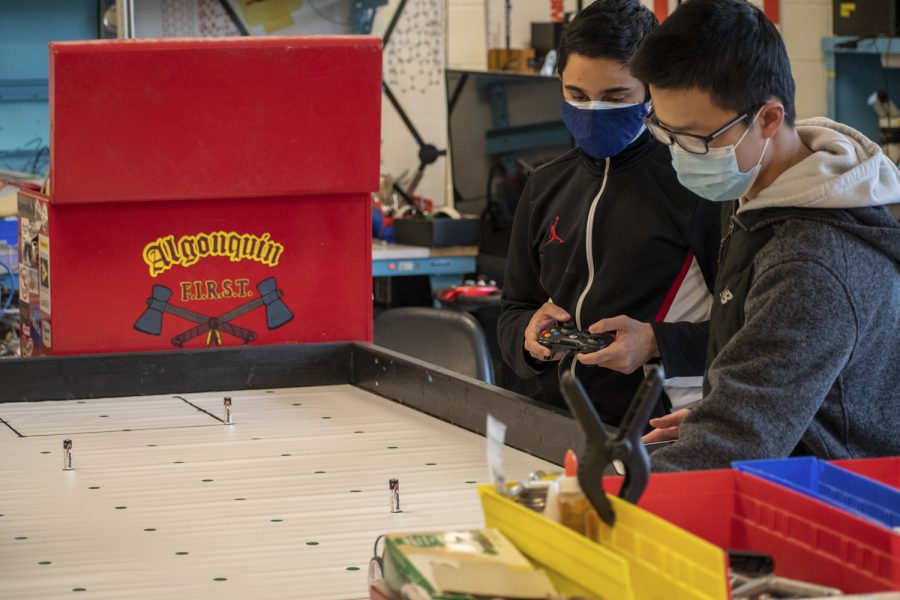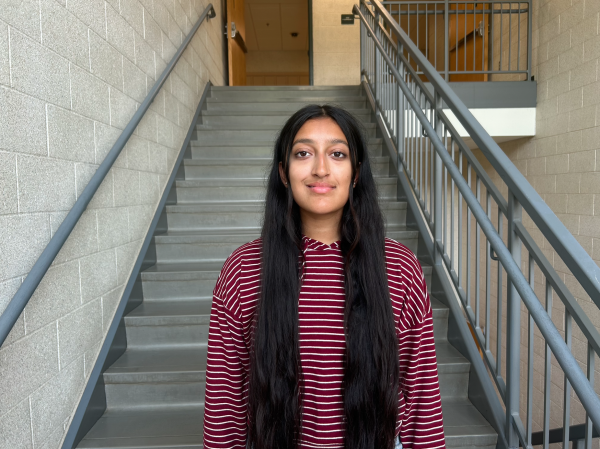Robotics team operates successfully during COVID
Robotics club members play with a Rasberry Pi powered robot that’s designed to move around a course. Sophomore Shivnath Shankar and freshman Jon Wang work together to keep the robot on its course.
May 11, 2021
This year, Robotics Team 1100 has succeeded in new projects and continuing old traditions despite COVID-19 restrictions.
Robotics Team 1100 usually competes in in-person competitions and engineering challenges, but this year, the pandemic affected how and what the team worked on.
“Normally we have in-person competitions where we build big robots and compete with other teams, but this year was a lot different,” outreach subteam leader Nick Seto said.
This year the team did not build a large robot for the FIRST Robotics Competition (FRC) as they have done in previous years.
“We focused on smaller robots that could be built with less time, resources and people,” mentor Dan Strickland said. “We were able to build two smaller robots because we had a Cohort A team and a Cohort B team.”
These smaller robots were for FIRST Tech Challenge (FTC), which was one difficulty level below FIRST Robotics Competition (FRC), in which the team usually competes with bigger robots.
“We went from a 120-pound robot to probably like an 18-inch by 18-inch by 18-inch robot, so the size reduced a lot,” senior co-captain Aniketh Dandu said.
Not only did the size of the robots decrease, but the size of the team itself did as well.
“Our team size reduced pretty dramatically from the 50 kids we normally have with a lot of mentors there helping us, to about 10 or so kids with only one mentor, so there was a lot more individual work,” Dandu said.
Students alone don’t make up the team; many mentors and coaches help and instruct the students.
“We have adults that are professionals in several different fields like accounting and engineering that come help and mentor the students,” Strickland said. “Part of the program is getting students connected with other professionals.”
Along with building the two smaller robots, the team participated in a game design challenge, modified last year’s robot and created a minibot, which was a programming challenge.
Meanwhile, the team has also contributed to the community.
“We are working with Proctor Elementary School to create online engineering challenges for them,” Strickland said. “We gave them an overall challenge to build something that would help after a natural disaster..
Each student received a kit of supplies that Algonquin students prepared for the engineering challenge.
Although COVID-19 has made many projects and tasks more difficult, it has made some things easier to accomplish than before the pandemic.
“Because we have adults who live and work relatively far away from here, it was easier to get a meeting of the adults together as well as student and adult meetings using Zoom,” Strickland said.
There have been other benefits to the team due to COVID-19 as well.
“Our organization has gotten a lot better since our time is so limited now; we were forced to adapt to being more organized and having better online tools,” Seto said.
Additionally, Dandu said that members were able to do much more work and activities they were not able to do in years past.
The team has also won the Chairman’s award for the second year in a row.
“The award is for teams that are role models for other teams, so that other teams should be able to replicate what these teams do with their outreach, team structure and impact on the students,” Seto said.
The process of winning this award was a long one.
“We had to write a 10,000 character essay as well as respond to 13 short answer questions,” Seto said. “Afterwards, we had to do a round of interviews, involving creating a seven-minute presentation and five-minutes of Q&A.”
Overall, Robotics Team 1100 is a club that is accessible to all students.
“A lot of people have this preconceived notion that robotics is all about super intense engineering and super nerdy people who have studied this stuff since they were a little kid, but that’s not close to reality at all,” Seto said. “Anyone can do it, and there are a ton of different ways to get involved, whether it be in software, outreach, mechanical, programming, CAD [computer and design] or electrical.”
Students interested in joining the robotics team can do so by emailing first.team1100@gmail.com.










